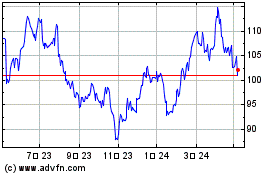By Jacob Gallagher
EARLY THIS FEBRUARY, before we all began sheltering in place,
visitors streamed into the Jeffrey Deitch Gallery in downtown
Manhattan to ogle a one-of-a-kind Porsche.
The refreshed vintage Porsche 964 coupe -- white with a shiny
red Pegasus emblem, a honey-tinted leather interior and a swooping
"duckbill" spoiler tacked on the back -- was designed by Teddy
Santis, the founder of Aimé Leon Dore, a 7-year-old streetwear
label based in Queens. The result of an official partnership
between the label and the German automaker, the car sat in the
gallery's center on an interwoven heap of Persian-style rugs. For
four days, Mr. Santis's fans poured through the doors in droves to
inspect the interior's splashes of Loro Piana fabric, scoop up
co-branded apparel and take photos of the extremely hyped,
extremely not-for-sale auto.
The partnership was the first of several 2020 pair-ups between
luxury automakers and youth-seducing clothing designers. This
April, Italy's Lamborghini and the streetwear virtuosos at Supreme
released a run of hoodies, quilted jackets, tees and other items
splayed with the car brand's glimmering gold-lettered logo. In
September, Mercedes-Benz debuted " Project Geländewagen," a widely
publicized and frankly confusing initiative in which the German
carmaker worked with artistic director Virgil Abloh of Off White
and Louis Vuitton to design a G-Class SUV. The only tangible
result: Sotheby's auctioned a one-third-scale mock-up of the
concept car, with the proceeds going to charity.
The most extensive collaboration yet -- between BMW and Kith, a
New York hoodie-and-sneaker emporium -- was unveiled last week. The
results included: a co-branded 94-piece clothing and accessories
line; a single rebuilt vintage BMW M3; and 150 special-edition,
Kith-branded M4 Competition sports cars that started at $109,250
and were distributed through BMW dealerships.
By selling an actual automobile, the BMW-Kith partnership most
closely resembles car and fashion pair-ups of the past, which
typically focused on producing limited-edition automobiles. Among
the many motor-minded marriages of the past: Lincoln and Givenchy
(1979), Peugeot and Lacoste (1984), Mercedes-Benz and Armani (2004)
and Thom Browne and Infiniti (2013).
During a preview last week, Kith owner Ronnie Fieg was quick to
point out that outsiders might underestimate the number of big
spenders who worship his brand. And true enough, within an hour of
the Friday morning release of the Kith-ified M4s, all 150 of the
six-figure cars were spoken for.
However, for the 2020 partnerships, selling a car is not, the
only (or even primary) objective; for the automobile brands, it's
also about targeting a young demographic that could someday evolve
into a reliable customer base. As Uwe Dreher, head of marketing for
at BMW North America put it, it doesn't matter if the "people who
buy the hoodie with the Kith BMW logo....also buy the car." As he
said in an interview before the launch, many of Kith's shoppers
aren't even old enough to drive. The partnership is also about
building awareness.
For car manufacturers, young people are an increasingly elusive
demo. "The people who are buying new cars are people my age, baby
boomers," said Carla Bailo, the president and CEO of the Center for
Automotive Research, a nonprofit in Michigan. A study released in
2019 by Sivak Applied Research found that in 2017, half of all
vehicle buyers in the U.S. were over 54 years old, while those 34
and under comprised just 14% of the total. Instead of purchasing
cars, many young people are turning to ridesharing apps like Uber
and Lyft.
Mr. Santis, the Aimé Leon Dore designer, said that Porsche
voiced these very concerns at the outset of his collaboration with
the brand. "They came to us and they felt like the sports car
consumer and enthusiast they had was kind of getting aged out. And
the newer kid, the younger kid was more caught up with, you know,
Uber and Lyft," he said. Deniz Keskin, Porsche's head of brand
management and sponsoring, said that "getting access to these new
people was definitely a plus" in working with Mr. Santis. Many of
the oglers who poured into the Jeffrey Deitch Gallery to see the
resulting car, he said, "were only coming from the angle of Teddy's
fashion brand and would normally not attend a Porsche-type
event."
Brandon Watson, 27, a commercial photographer in Buffalo, N.Y.,
was one such onlooker. As a longstanding Aimé Leon Dore customer,
he was duly impressed that Porsche tapped an emerging clothing
label. By tying itself with a "streetwear brand," Mr. Watson said,
the automaker "refreshed people's memories of what Porsche actually
is."
And what's the perfect way to draw in auto-agnostic kids?
Clothes. If streetwear has proven anything, it's that when armed
with enough clout a clothing brand can make any partner -- no
matter how random -- appear desirable via a co-branded T-shirt or
hoodie. Kith's recent collaborators, for example, have included
properties as disparate as the see-and-be-seen eatery Nobu, Looney
Tunes and Coca-Cola.
Such apparent randomness aside, Mr. Fieg said that he's felt a
personal connection to all of Kith's collaborators. BMW is no
different: his grandfather owned a 1989 M3, the same model Mr. Fieg
worked on restoring as part of the collaboration. As for the idea
that anything he stuck his logo on would sell, Mr. Fieg said "I
never go into anything assuming that. But we have definitely built
a loyal consumer in nine years." "Loyal" might be an
understatement: All of Kith's recent collaborations have sold out
swiftly.
In both the BMW and the Porsche collaborations, the idea of
bundling in co-branded tees, keychains and other take-home
souvenirs came from the clothing brands. Both Mr. Fieg and Mr.
Santis viewed that element as vital to making the collaborations a
success. "There's got to be some component of product or
merchandise or something tangible that the kid who knows nothing
about what we're talking about shows up and leaves with something,"
said Mr. Santis. Porsche went along with the idea of offering
clothes; the collaborative pieces sold out in two days.
The art gallery event also allowed Porsche to wiggle further
into Instagram, another key piece of the teen-and-twenty-something
ecosystem. The entire space was set up like one giant Instagram
shoot, complete with the sort of verdant potted plants you can't
escape on the social media platform. Even after the clothes sold
out, fans continued to pour into the Dietch gallery to snap selfies
next to the Porsche.
Covid-19 has temporarily derailed plans to host these kinds of
bustling events, though automakers are trying to find workarounds.
For "Project Geländewagen," Mercedes-Benz created a digital
simulacrum of the car that Instagram users could "place" in their
homes using augmented reality. Though in theory a savvy way to
bring the collaboration right to users, the technology proved a
little awkward to use. (Mercedes-Benz declined to be interviewed
for this story.)
Meanwhile, BMW and Kith previewed their collaboration for
editors and influencers at a small, relatively socially distanced
event in Brooklyn, spurring some buzz on social media -- albeit
much less than Porsche enjoyed from its partnership with Aimé Leon
Dore. Nevertheless, by Friday afternoon, just a few hours after it
launched on Kith's website, most of the clothing collection had
sold out.
Write to Jacob Gallagher at Jacob.Gallagher@wsj.com
(END) Dow Jones Newswires
October 26, 2020 12:14 ET (16:14 GMT)
Copyright (c) 2020 Dow Jones & Company, Inc.
Bayerische Motoren Werke (TG:BMW)
過去 株価チャート
から 3 2024 まで 4 2024

Bayerische Motoren Werke (TG:BMW)
過去 株価チャート
から 4 2023 まで 4 2024
